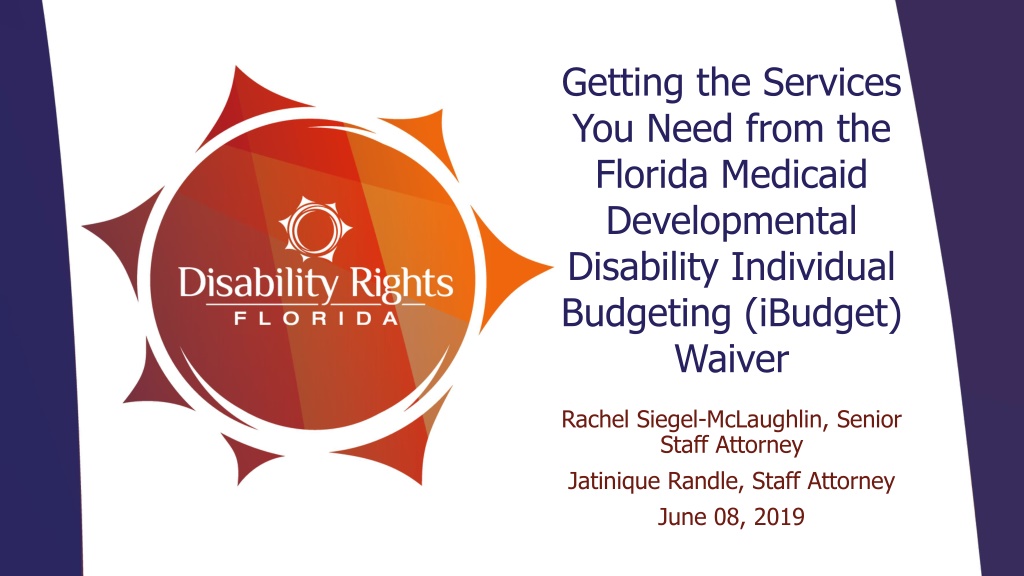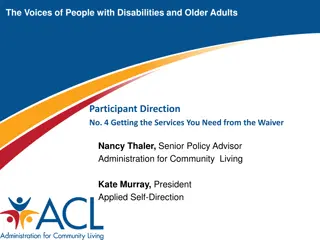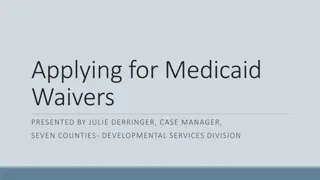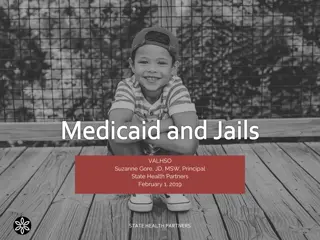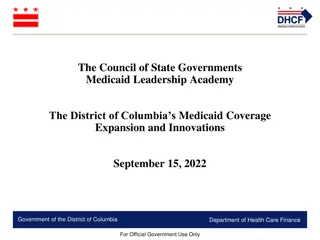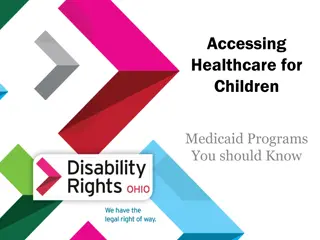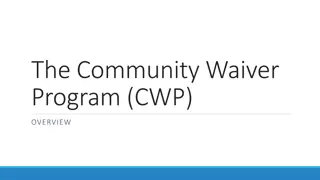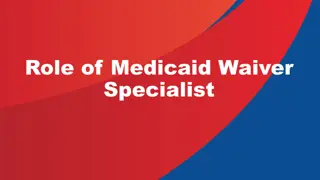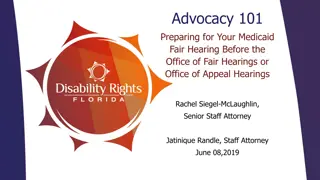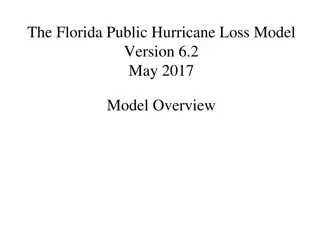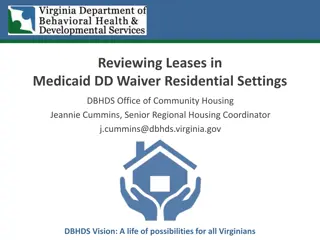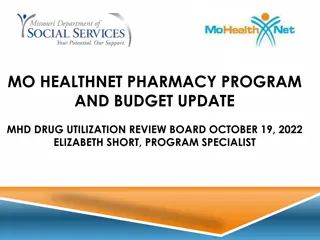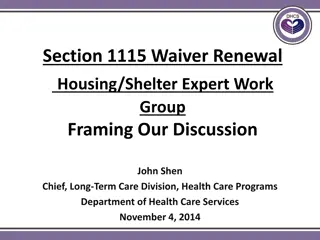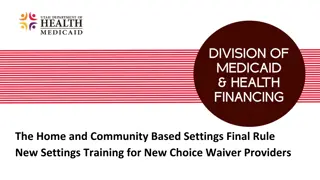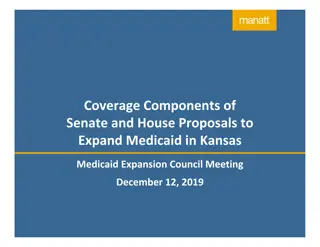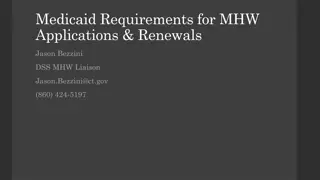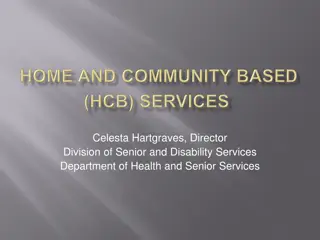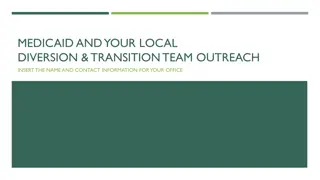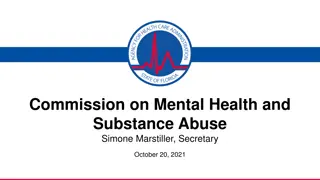How to Get Services from Florida Medicaid iBudget Waiver
Learn about accessing services through the Florida Medicaid Developmental Disability Individual Budgeting (iBudget) Waiver, including eligibility requirements, application process, and available services for individuals with developmental disabilities. Discover important information on preparing applications, requesting funding, and appealing denials or service reductions.
Download Presentation

Please find below an Image/Link to download the presentation.
The content on the website is provided AS IS for your information and personal use only. It may not be sold, licensed, or shared on other websites without obtaining consent from the author. Download presentation by click this link. If you encounter any issues during the download, it is possible that the publisher has removed the file from their server.
E N D
Presentation Transcript
Getting the Services You Need from the Florida Medicaid Developmental Disability Individual Budgeting (iBudget) Waiver Rachel Siegel-McLaughlin, Senior Staff Attorney Jatinique Randle, Staff Attorney June 08, 2019
Disability Rights Florida Funding, responsibility, and authority under nine federal programs to protect the rights of Floridians with disabilities. A not-for-profit corporation since 1987. Offices in Tallahassee, Tampa, Gainesville and Hollywood. A few other satellite offices around the state. 2
Our Mission To advance the quality of life, dignity, equality, self determination, and freedom of choice of persons with disabilities through collaboration, education, advocacy, as well as legal and legislative strategies. 3
Agenda Preparing your APD application When to request a crisis application if you are on the Medicaid Waiver Waitlist How to make a Significant Additional Needs funding request How to request and prepare for an Appeal following a denial, termination, or service reduction 4
iBudget Waiver Eligibility Rule 65G - 4.015 F.A.C. In order to be eligible for services, applicants must: Be at least 3 years of age Be a resident of and domiciled in the State of Florida Have a confirmed diagnosis of one of the following Developmental Disabilities (next slide) iBudget Waiver services are only available to persons who meet the requirements for receiving home and community-based services and have a developmental disability which occurs prior to age 18. 5
Eligibility Categories: Intellectual Disability Autism Spina Bifida Cerebral Palsy Prader-Willi Down Syndrome Phelan-McDermid syndrome Children between the ages of 3-5 at a high risk for a developmental disability 6
Eligibility Application Rule 65G- 4.016 F.A.C. Available online at: http://apd.myflorida.com/customers/application/ Upon receipt of a completed, signed, and dated Application for Services, the area agency staff shall review the application and supporting documentation and notify the applicant of the final determination within: 45 days for children under the age of 6 60 days for individuals 6 years of age and older If requests for collateral information or additional evaluations are necessary to determine eligibility, the time may be extended for no more than an additional ninety (90) days. 7
Preparing Your Application How to prepare your application: Check eligibility category for clarification of criteria Collect records: Medical Records School records psychoeducational evaluations, IEPs, etc. Social Security Evaluations Evidence that will show the disability manifested prior to age 18 If the applicant is unable to produce an existing evaluation that establishes eligibility or if there is a concern that the information provided is inaccurate, incorrect, or incomplete, the agency area office will be responsible for obtaining an evaluation to establish eligibility. Rule 65G- 4.016(3) 8
Waiting List After you apply, a decision will be made about eligibility If you are found to be eligible for services, you will be placed on a waiting list which is prioritized by category Florida Medicaid Waiver's waiting list contains more than 20,000 individuals How to get off the waitlist and obtain services: File a Crisis Application Request Additional Funding to move individuals off of the Waitlist 393.065(5)(b) The agency shall provide services for individuals 18-21 who need both waiver services and extended foster care 9
Crisis Application Rule 65G- 1.046 F.A.C. Waiver applicants who are in a crisis situation should contact the APD Regional Office Serving their county Who can make the request: Applicant Applicant s Family Applicant s Guardian or Guardian Advocate Applicant s Waiver Support Coordinator When you submit a Crisis Application: Attach Records to establish crisis Letters, eviction notices, hospital records, police arrests, Baker Acts, etc. 10
Crisis Application - Criteria Crisis Criteria (Fla. Rule 65G-1.047): 1st priority Homeless: The applicant is currently homeless, living in a homeless shelter, or living with relatives in an unsafe environment 2nd priority Danger to self or others: The applicant exhibits behaviors that, without provision of immediate waiver services, may create a life-threatening situation for the applicant or others, or that may result in bodily harm to the applicant or others requiring emergency medical care from a physician. 3rd priority Caregiver unable to give care: The applicant s current caregiver is in extreme duress and is no longer able to provide for the applicant s health and safety because of illness, injury, or advanced age. 11
Crisis Application Decision If your application is denied at the APD Area Office Level: The APD Area Office will notify the applicant or applicant s representative in writing of a denial of crisis enrollment. If the Area Office concludes that the applicant may meet crisis status and other programs cannot meet the applicant s service needs, the Area Office will submit the initial assessment to the Central Office for review and final determination. The Central Office will notify the Area Office of whether it has approved or denied the application. The Area Office is responsible for notifying the applicant or applicant s representative of the final crisis determination in writing. The notice will contain instructions on how to request an appeal of the decision 12
Transition from Wait List to Waiver Establish Medicaid Eligibility Choose a Waiver Support Coordinator (WSC) Receive iBudget Allocation Algorithm Amount Participate in AIM Meeting with your chosen WSC Your WSC will submit the completed AIM worksheet, SAN request, and other supporting documents to APD. APD issues a Notice of Approval of Waiver Enrollment and iBudget Amount During this process, APD can preapprove support coordination and any services critical to ensuring health and safety 13
Significant Additional Needs (SAN) Request Rule 65G-4.0218 Supplemental funding may be of a one-time, temporary, or long-term nature including the loss of school system services due to a change in age. A WSC shall submit any requests for SAN funding on behalf of an individual. A SAN request can be made anytime, not just in conjunction with your AIM following the receipt of your iBudget Algorithm Allocation 14
SAN Request There Are Four (4) Basis For SAN funding requests: The health and safety of the individual and those around them are in serious and immediate jeopardy unless additional funding is provided. A need for one-time or temporary support or services. If not provided it would place the health and safety of the individual and those around in serious jeopardy. 12 consecutive months or less. There are changes in the individual s circumstance or condition. This change occurred after the start of the service plan year and would place the health and safety of the individual and others around in serious jeopardy. There is a significant need for transportation services to and from waiver-funded programs or employment that cannot be funded with the current iBudget amount without negatively affecting the individual. Additionally, public transportation is not available as an option given the individual s needs. 15
Supporting Your SAN Documentation of attempts to locate natural or community supports, third party payers, or other sources of support to meet the individual s health and safety needs must be submitted. Support Plan Updated Questionnaire for Situational Information (QSI) Cost plans Expenditure history Updated evaluations or plans of care (if applicable) Documentation from caregivers Documentation from providers 16
SAN Request Timeline The Agency shall provide a response: Within 30 days from the date of the SAN request submission if the Agency does not request additional documentation Within 60 days from the date of the SAN request submission if the Agency does request additional documentation If you do not receive a Notice within the 30 or 60 day timeframes, the client or WSC may notify the Agency in writing of the failure to issue a timely notice Failure of the Agency to issue this Notice within 20 days shall mean the requested funding for services are authorized as of the 21st day 17
Agency Notice The Agency must send you a written notice whenever it denies, reduces, or terminates supports or services Verbal notice is not enough, do not accept verbal or other informal notice through your case worker or support coordinator Insist on written notice sent to you from the agency If you do not receive written notice, request it as soon as possible 18
Reading Your Notice Look for these three things: 1. Amount of the denial/reduction 2. Justification for the denial/reduction 3. Appeal rights and instructions Formats change, but content does not Look at examples provided in Advocacy 101 and in the appendix of this presentation http://www.disabilityrightsflorida.org/documents/Advocacy_101.pdf 19
Requesting an Appeal Follow the instructions in the Notice The deadline for requesting an appeal is 30 days from your receipt of the notice Be sure to make it clear if you wish to continue to receive services pending the outcome of the appeal Make a written request for the appeal if possible, and save a dated copy of this request 20
Office of Appeal Hearings Contact information for the Office of Appeal Hearings: Department of Children and Families, Office of Appeal Hearings 1317 Winewood Blvd, Bldg. 5, Room 255 Tallahassee, Florida 32399 Telephone: (850) 488-1429 Fax: (850) 487-0662 Email: appeal.hearings@myflfamilies.com 21
Words to Know Petitioner: The person requesting an appeal, the person who s services are being reduced or denied Respondent: The Agency or organization that has reduced or denied petitioner s services Exhibit: A piece or set of evidence in a hearing Hearing Officer: The presiding officer or judge at your hearing Burden of Proof: This is the burden placed on either the Petitioner or Respondent to prove their case by a preponderance of the evidence 22
5 Steps of Preparation You should get a letter from the Office of Appeal Hearings stating when and where the hearing will be held 5 steps: 1. Research the laws and rules that affect your care many can be found online, including some links provided in the Advocacy 101 manual 2. Write your arguments 3. Gather evidence and witnesses to support those arguments 4. Prepare your testimony 5. Request information from the Agency through the Discovery process If you need more time to prepare, you can request a continuance from the hearing officer, submit your request in writing. 23
The Hearing Itself The hearing can be telephonic or in-person Conference room setting The hearing officer, the Petitioner s party, Agency area staff and potentially an Agency attorney will be present Try to approach the hearing and your arguments from a logical and rational, not emotional, standpoint Let the Hearing Officer guide the proceedings, but do not be afraid to speak up 24
Requesting Accommodations The Office of Appeal Hearings (OAH) must comply with the Americans with Disabilities Act, a federal law. In your notice of hearing and on OAH s website, there are instructions for persons needing special accommodations. Special accommodations are provided for all persons attending the hearing, including witnesses, to ensure that every person is able to fully participate in the hearing. Persons needing a special accommodation should contact the hearing office at least seven days prior to the hearing. The hearing office may be contacted by telephone at (850) 488-1429, by Fax at (850) 487-0662, in writing at Department of Children and Families, Office of Appeal Hearings, Building 5, Room 255, 1317 Winewood Boulevard, Tallahassee, FL 32399-0700 and by email at: appeal.hearings@myflfamilies.com 25
How to Prove Your Case You have to know the law You cannot rely only on a sense of fairness or unproven need You need to know who has the burden of proof You should assert facts that you can prove Avoid generic or summary language Respond directly to the agency s arguments Listen carefully and take notes 26
What Happens Next? There will not be an immediate response from the Hearing Officer Submitting Proposed Final Orders Receiving your Final Order from the Hearing Officer 27
Appeals An appeal must be filed within 30 days of the Final Order You may file in either the 1st District Court of Appeals or the District of your residency Appeals must be based on legal issues, not factual issues and ONLY on issues raised during the hearing Clerk of Courts are a valuable resource 28
Contact Us: 2473 Care Drive, Suite 200 Tallahassee, Florida 32308 800.342.0823 TDD 800.346.4127 www.DisabilityRightsFlorida.org 29
